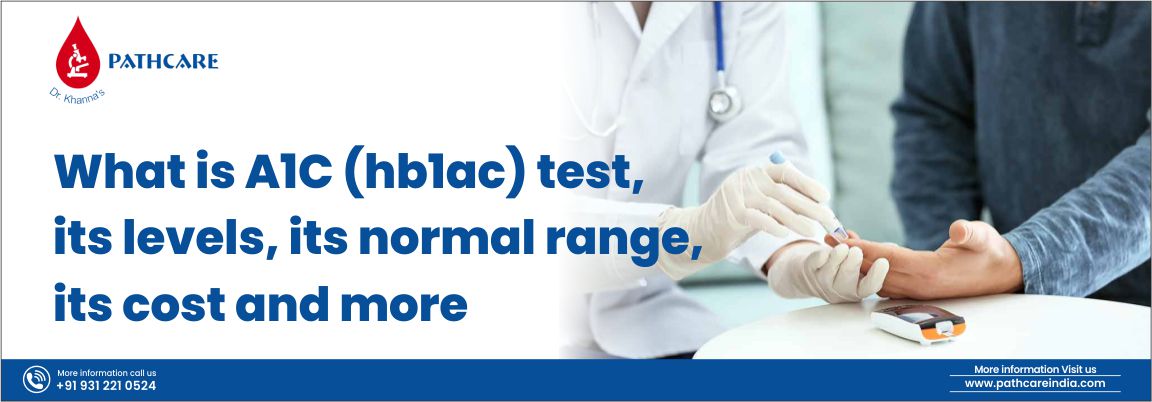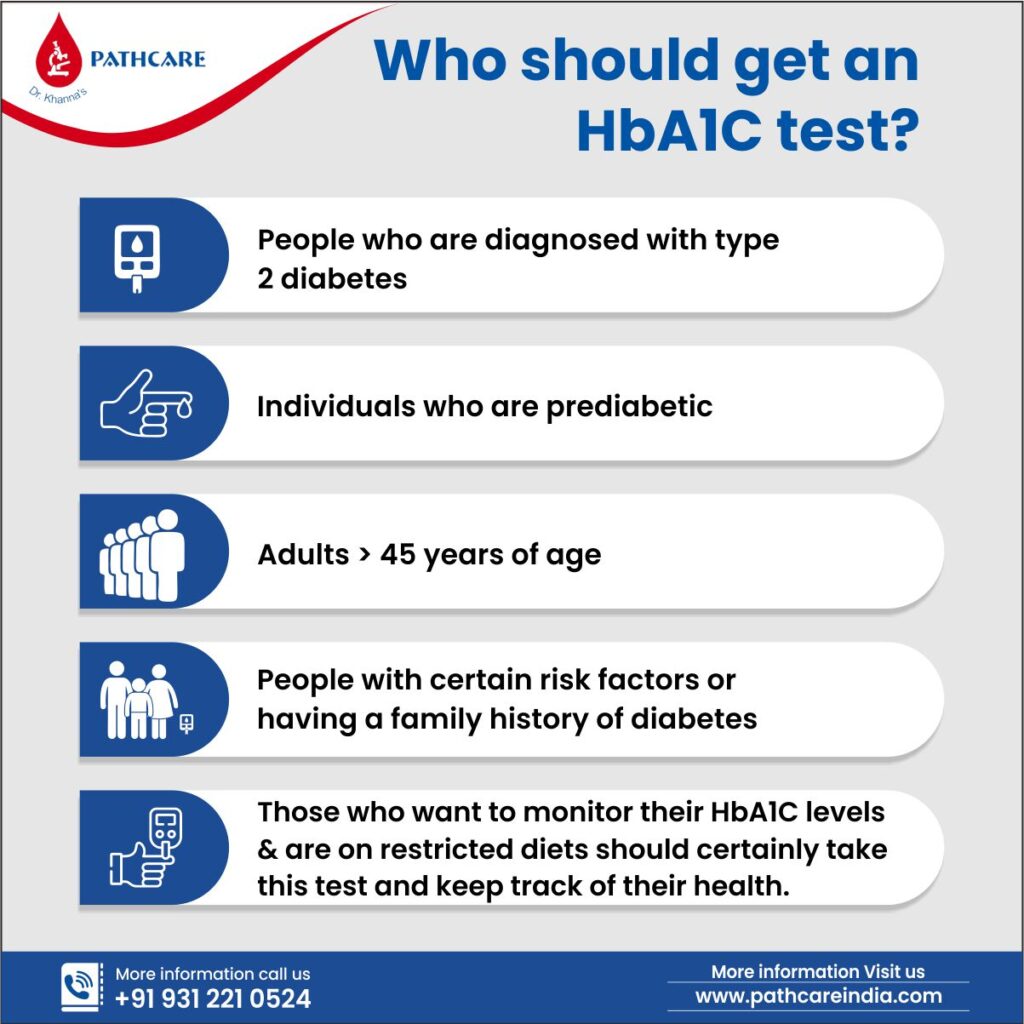No products in the cart.

Get the best Diabetes HbA1c test done at PathCare India. We offer the most affordable prices for all diabetes tests in Delhi. Call us today!
How does HbA1c work?
The HbA1c is a measure of your average blood glucose levels over the last two to three months. The ideal level of HbA1c for diabetics is 48 mmol/mol (6.5%).
You should aim for an HbA1c level below 42 mmol/mol (6%) if you are at risk of developing type 2 diabetes.
The purpose of this page is to explain what HbA1c is and why it’s so critical to aim for your target level.
What is Hb1Ac?
HbA1c stands for glycated hemoglobin. This happens when glucose (sugar) sticks to red blood cells in your body. Sugar can’t be used properly by your body, so more of it sticks to your blood cells. It’s imperative to take a reading every three months since red blood cells are active for about 2-3 months.
High HbA1c levels indicate high blood sugar levels. Having diabetes increases your risk of developing complications, such as eye and foot problems.
HbA1C test is also known as:
- A1C test
- the glycated hemoglobin test
- the glycohemoglobin test
The HbA1C test stands for hemoglobin A1c. Hemoglobin is the protein that is present in red blood cells (RBC’s), and its function is to transport oxygen around the body.
Keeping track of your HbA1c level and lowering it will help you avoid devastating complications. Regularly checking your HbA1c is essential. Your annual review should include this vital check. You should take this test at least once a year. It’ll be done every three to six months if your HbA1c is high or needs a little extra attention. Make sure you don’t skip these tests, so if it has been more than a year since you last took this test, contact your healthcare provider or take the test right now!
Understanding what your HbA1c level means and how to prevent it from increasing is essential once you know it. If your HbA1c level is even slightly elevated, you are more likely to suffer from serious complications, so learn all the facts about HbA1c here.
Who should get an HbA1C test?
- People who are diagnosed with type 2 diabetes
- Individuals who are prediabetic
- Adults > 45 years of age
- People with certain risk factors or having a family history of diabetes
- Those who want to monitor their HbA1C levels and are on restricted diets should certainly take this test and keep track of their health.
What does your HbA1c result mean?
In order to help you manage your levels better, your healthcare team will use the HbA1c test to determine whether you need to change your treatment or medication. In addition, it also tells you a number, which is important to understand. Keep track of your results in a diary if you find it helpful, to see if there are any trends you can identify.
There are many reasons why your HbA1c can change, including:
- If you are ill
- If you take other medicines, such as steroids
- Changing lifestyles
- If you’re depressed or stressed
You’ll discuss a target level with your healthcare team. This isn’t as easy as it sounds, but it’s important you do everything you can to stay within your target range. Even a slight increase in your HbA1c level puts you at risk for life-threatening complications. You can lower your HbA1c by keeping track of it by proper diagnosis.
What is the normal range for HbA1c?
An ideal HbA1c level for diabetics is 48 mmol/mol (6.5%) or below
Targets and levels of HbA1c
However, everyone is different. You may be given an individual target level based on your current level and your next test date. As a result, you can bring it down in stages instead of bringing it down suddenly.
Are there any factors that can affect HbA1C results?
Several factors can contribute to inaccurate HbA1C results, including:
- Kidney/nephrological problems
- Liver disorders
- Severe anemia/ low serum iron
- blood loss or blood transfusions
- early or late pregnancy
- medications, such as opioids and some HIV medications
- Stress
There are also certain people who have hemoglobin types that are less common, which can affect lab results. People with blood disorders such as sickle cell anemia or thalassemia and those of African, Mediterranean, or Southeast Asian descent, fall into this category.
What is the importance of testing?
Even if a person does not have diabetes, increased blood sugar and HbA1C levels are associated with health complications. In people with diabetes, high HbA1C levels are a significant risk factor for cardiovascular disease and stroke.
The higher the HbA1C percentage, the greater the risk of prediabetes developing into type 2 diabetes and complications developing for those who have already been diagnosed with diabetes.
Prevent health complications by using the HbA1C test
To prevent blood sugar levels from becoming too high, people with diabetes need to manage their blood sugar levels.
By managing blood sugar levels, complications of the eyes, kidneys, and coronary arteries can be reduced. By doing so, you can prevent many problems associated with diabetes, such as
- loss of vision
- cardiovascular disorders
- Strokeke
- kidney dysfunction
It is possible to significantly reduce these risks by maintaining an HbA1C level of 7% or lower.
Every individual is different. Individuals can thus work with healthcare professionals to determine their HbA1C and blood sugar targets.
PathCare Hb1Ac test cost in Delhi
The Path care Hb1Ac test cost is very affordable. We offer the most affordable prices for all diabetes tests and related services.
| Test Name | Cost |
| Hb1Ac test: | Rs. 500/- |
How is the Hb1Ac test performed?
This is a blood test. A small blood sample will be taken from your arm and sent to a laboratory for analysis. The results of the test will be available in 24 hours. No fasting is required for this test.
FAQs
What happens during an HbA1C test?
Our experienced phlebotomist will take a blood sample from a vein in your arm. Following the insertion of the needle, a small amount of blood is collected in a test tube or vial. You may feel a little sting during the insertion or removal of the needle. It is usually a five-minute procedure.
Will I need to do anything to prepare for the test?
Tests for Hb1AC do not require special preparation.
Are there any risks to the test?
The risk of having a blood test is very low. A needle puncture may cause bruising or slight pain, but most symptoms disappear quickly.





